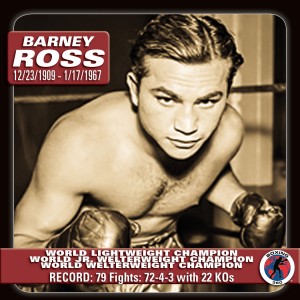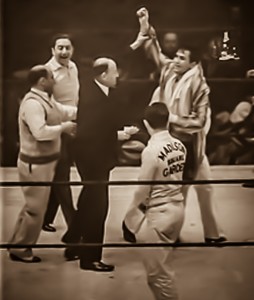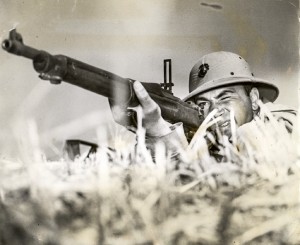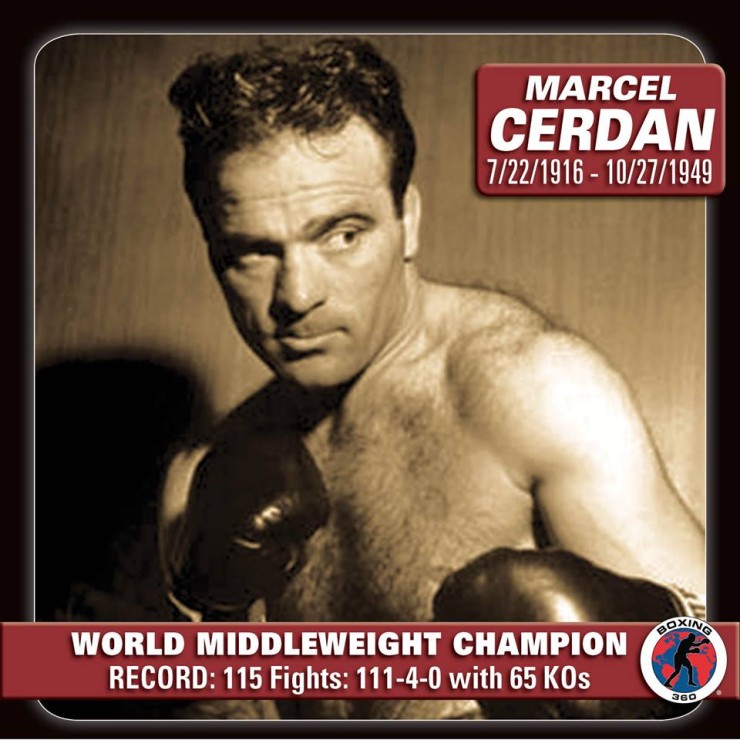Today in Boxing History: May 28, 1934
Barney Ross W 15 Jimmy McLarnin, Long Island City, NY.
Wins World Welterweight Title.

79 years ago today, May 28, 1934 Barney Ross wins World Welterweight title against Jimmy McLarnin, Madison Square Garden, Long Island City, NY.
Barney Ross (born Dov-Ber “Beryl” David Rosofsky; December 23, 1909 – January 17, 1967) was an American professional boxer. Ross became a world champion in three weight divisions and was a decorated veteran of World War II.

Ross enlisted in the United States Marine Corps to fight in World War II. Ross was awarded America’s third highest military honor, the Silver Star, as well as a Presidential Citation. As one of America’s greatest “celebrity” war heroes, he was honored by President Roosevelt in a Rose Garden ceremony.
He wrote an autobiography titled “No Man Stands Alone”.
Inducted into the The Ring Boxing Hall of Fame in 1956.
Inducted into the World Boxing Hall of Fame in 1981.
Inducted into the International Boxing Hall of Fame in 1990.
Inducted into the United States Marine Corps Sports Hall of Fame in 2006.
The May 1994 issue of The Ring ranked Ross as the third greatest junior welterweight and fourth greatest welterweight of all-time.
In 1999, The Associated Press ranked Ross as the second best junior welterweight and fifth best welterweight of the 20th century

Barney Ross | WAR HERO
Ross enlisted in the United States Marine Corps. during WWII and became a much-decorated veteran.
Although he was assigned to work as a boxing instructor, he requested that he be sent into combat. He was sent to Guadalcanal Island, where one of the most brutal U.S. military engagements ever took place against the Japanese.
On November 19, 1942, Ross and three comrades were out on patrol and were attacked by Japanese troops. His three fellow Marines were wounded and Ross shepherded them into a crater hole where he protected them throughout the night. He fired over 200 rounds of ammunition and was credited with having killed seven Japanese snipers and about 10 probables. By the morning, two of his colleagues had died and he was able to carry the sole survivor to safety. For these exploits, Ross received the Silver Star, Purple Heart, and a Presidential Citation.
“Ross had style, combatively and socially. His manners were impeccable; his generosity and thoughtfulness have become almost legendary.” Alan Ward (1967)
http://www.youtube.com/watch?v=dvLqnF7crCM
The 1957 movie “Monkey On My Back” was about Ross and his addiction to morphine. Ross approved the script but was upset with the advertising. “The advertising makes it seem that I am still a narcotics addict and that defeats the whole purpose of the picture,” he said. He sued the producers for $5 million, claiming defamation of character. He settled out of court in 1960 for $10,000.
While Ross was in a military hospital recovering from the wounds he received on Guadalcanal Island, as well as a bad case of malaria, he was treated with morphine and became addicted. At the height of his addiction, the habit was costing him up to $500 per day. In September 1946, he voluntarily appeared in the U.S. Marshal’s office in New York and asked to be admitted into a federal drug treatment facility. Ross was admitted to the U.S. Public Health Service Hospital near Lexington, Kentucky. He was discharged by Dr. Victor M. Vogel in January 1947. Some doctors predicted that it would take Ross a year to get clean, but he kicked the habit in four months. him. Although the film isn’t graphic in its depiction of a fallen man caught up in the throes of a powerful addiction, it was still very much ahead of its time.





